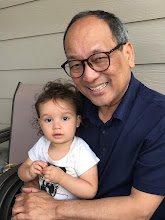My siblings and I. August 2011 at Kota Bharu airport.
My childhood memories filled more stories with my younger brother Azam. Azam was about twelve when my sister, Irawanis came along. Both Azam and I were delivered by traditional midwife and we were born in Kampong Manik Urai Lama at our maternal grandparents' house. I remember the house was built high above the ground; and the tree barks covered the house wall all around. The kitchen and front steps were made out of bamboo sticks placed close together. There were always bananas and or durians placed by the front part of the living room. There was a lemon tree in front of the house. There was no running water connected to the house but there was a water faucet immediately in front of the house where neighbors came to fill their buckets, shower and do their laundry but a playtime for my cousins and I.
We have to pass by a cemetery in order to get to the river for swimming and often to accompany our aunts when they do their laundry and we were made to bring home at least a bucket full of water. The public water faucet was unreliable at best and at times, it ran dry for days on end. Cemetery was good to scare the daylight of yourself with wild childhood imaginations. I often get physically close to others while walking close to the cemetery and never pretended that I was the brave one. Perhaps I display my authenticity and congruence at a very early age. Perhaps that taught me the value of being honest and the prize of being yourself even at the expense of being teased a little afterwards.
I was always told of a difficult birth that I put my mother through. She was in labor for days. I am her first born child and a third grandchild to my maternal grandparents. But to my paternal grandparents, I am their first grandchild technically. You see my older cousin was with his mother (my aunt) who followed her husband and migrated to Palembang, Indonesia soon after Japanese surrendered to the British at the end of Second World War. Yes, I born while the British colonized Malaya and Malaya was put under an emergency rule, a way in which the British contained the spread of communist insurgencies in the countryside. So they carved out areas for settlement and named those as Kampong Baru or new village and all the people in surrounding areas were made to live and build their houses within the area.
Relatives gathered waiting for my arrival. Weeks before this, and according to tradition, the midwife broke the coconut in halves in top of bulging pregnant stomach of my mother. When the knife hit the coconut, the first half split and hit my mother's forehead. Witnessing this, my paternal grandfather read to mean that the child to be born would be a male who would be travelling farther than his father has ever been. People believe such stipulations and perhaps that kind of dictum stayed with my mother and how she seems accepting of my being away from her since age 12. She appears to cope well with me being away knowing that such prediction was made long before I was even born and while I was still in her stomach.
But I hailed from a line of travelers and immigrants. My paternal grandfather migrated from Marang Trengganu via sailing salt boat plying the coastal waters of South China Sea and landed and settled in Perupok near Bachok when he married grandma. My own father migrated because of his work to inland back country Manik Urai where the living was rather hard and harsh relative to coastal more urbane region of Kelantan. My father and mother moved to Mahligai when I was about 2 or 3 and my brother was an infant. That migration, that is staying and making a living in a place other than where your were born and raised, continues generation after generations without us realizing the pattern. Bowen would call this intergenerational transmissions of a pattern.
[more to come] [the above is draft copy without any proof reading and editing efforts. It is simply a jotting down of thoughts as it came] [ I would want to expand and elaborate more on each paragraph at a later time, perhaps include pictures]


No comments:
Post a Comment